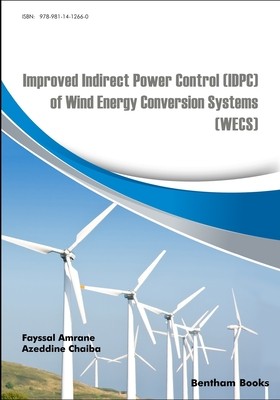
- We will send in 10–14 business days.
- Author: Azeddine Chaiba
- Publisher: Bentham Science Publishers
- ISBN-10: 9811412669
- ISBN-13: 9789811412660
- Format: 17.8 x 25.4 x 1 cm, softcover
- Language: English
- SAVE -10% with code: EXTRA
Improved Indirect Power Control (IDPC) of Wind Energy Conversion Systems (WECS) (e-book) (used book) | bookbook.eu
Reviews
Description
Wind power capacity in the world has been increased by more than 30% over the last decade in countries which have prominent installations. Wind energy conversion systems (WECSs) based on the doubly-fed induction generator (DFIG) have dominated the wind power generation sector due to the outstanding advantages they provide, including small converter ratings (around 30% of the generator rating) and lower converter costs.Due to the non-linearity of wind power systems, the DFIG power control setup presents a big challenge especially under conditions of high variance in wind-speed and parameter sensing. To overcome these major problems, an improved IDPC (Indirect Power Control) system based on PID (Proportional-Integral- Derivative) controller, has been proposed instead of the conventional power inverters.This handbook covers information about IDPC based WECS. The book starts with a general introduction to wind power system basics. Subsequent chapters provide additional knowledge about robustness tests and adaptive / intelligent control systems employed in wind energy systems. The new concept of direct and quadrature current control (Ird & Irq) under MPPT (Maximum Power Point Tracking) strategy is also explained along with novel fuzzy logic type control systems. The authors have included detailed diagrams and an appendix of WECS parameters, making this handbook a useful primer for engineering students working towards completing licenses, Masters degrees and Post-graduation programs in advanced wind power energy systems.
EXTRA 10 % discount with code: EXTRA
The promotion ends in 19d.10:06:10
The discount code is valid when purchasing from 10 €. Discounts do not stack.
- Author: Azeddine Chaiba
- Publisher: Bentham Science Publishers
- ISBN-10: 9811412669
- ISBN-13: 9789811412660
- Format: 17.8 x 25.4 x 1 cm, softcover
- Language: English English
Wind power capacity in the world has been increased by more than 30% over the last decade in countries which have prominent installations. Wind energy conversion systems (WECSs) based on the doubly-fed induction generator (DFIG) have dominated the wind power generation sector due to the outstanding advantages they provide, including small converter ratings (around 30% of the generator rating) and lower converter costs.Due to the non-linearity of wind power systems, the DFIG power control setup presents a big challenge especially under conditions of high variance in wind-speed and parameter sensing. To overcome these major problems, an improved IDPC (Indirect Power Control) system based on PID (Proportional-Integral- Derivative) controller, has been proposed instead of the conventional power inverters.This handbook covers information about IDPC based WECS. The book starts with a general introduction to wind power system basics. Subsequent chapters provide additional knowledge about robustness tests and adaptive / intelligent control systems employed in wind energy systems. The new concept of direct and quadrature current control (Ird & Irq) under MPPT (Maximum Power Point Tracking) strategy is also explained along with novel fuzzy logic type control systems. The authors have included detailed diagrams and an appendix of WECS parameters, making this handbook a useful primer for engineering students working towards completing licenses, Masters degrees and Post-graduation programs in advanced wind power energy systems.


Reviews